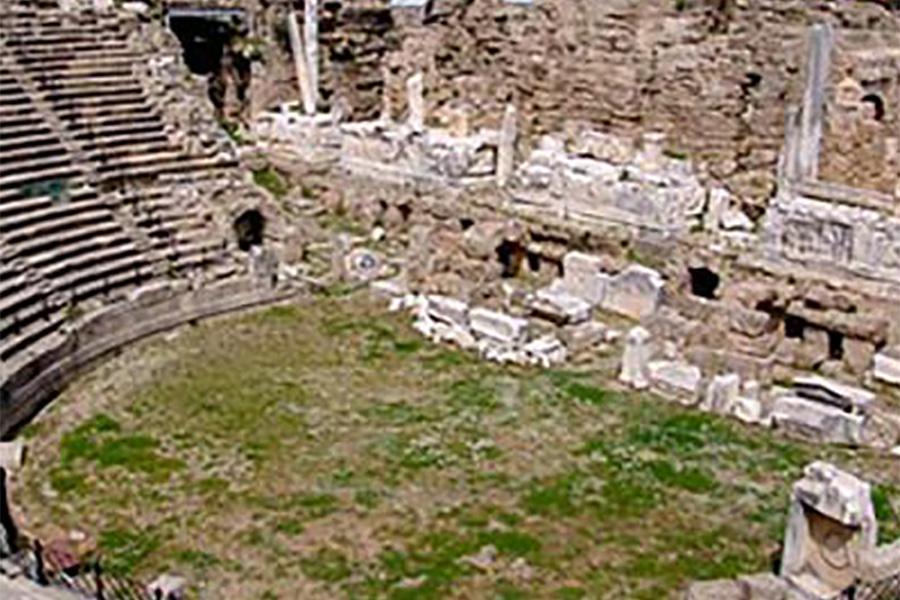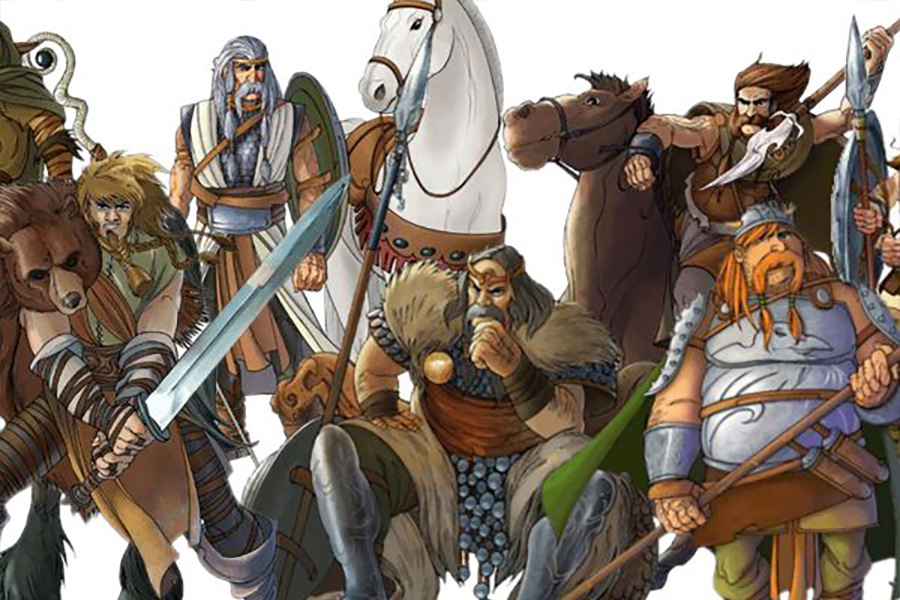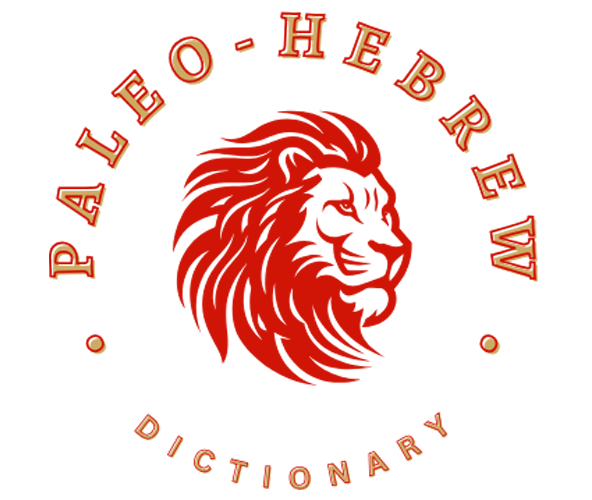The word galathayah (𐤂𐤋𐤈𐤉𐤄) or “Galatia” is an ancient area in the highlands of central Anatolia, roughly corresponding to the provinces of Ankara and Eskişehir, in modern Turkey. It was named after the Gauls or 𐤂𐤀𐤋𐤉𐤄 (Gaalayah) from Thrace, who settled there and became its ruling caste in the 3rd century BC (3525 ― 3625 A.M.), following the Gallic invasion of the Balkans in 279 BC (3646 A.M.). It has been called the “Gallia” of the East; Roman writers call its inhabitants Galli (Gauls or Celts).
The territory was bounded on the north by Bithynia and Paphlagonia, on the east by Pontus and Cappadocia, on the south by Cilicia and Lycaonia, and on the west by Phrygia. Its capital was Ancyra (i.e. Ankara, today the capital of modern Turkey).
The Paleo-Hebrew language or the original language of the Ābarayam is one spoken with an emphasis on the rauakh (breath, wind, spirit). With the language of the Ābarayam, each letter has a meaning and a number associated with it that adds meaning to each word they’re used with. Below you will be able to learn more about the letter in Ancient Hebrew, Yiddish Hebrew, Greek, and much more.
Letter Meanings
| Letter | Meaning |
|---|---|
| 𐤂 (g) – g | Foot, pride, camel |
| 𐤋 (l) – la | Staff, Goad, Control, Toward, Protect, Authority, bind, yoke, lead |
| 𐤈 (th) – tha | Basket, Snake, Surround, Store, Contain, clay, below, womb |
| 𐤉 (y) – ya | Arm, hand, work, thrust, deed, make, throw, worship |
| 𐤄 (h) – ha | look, behold, the, reveal, breath, life, man Sufix: to, toward, in the direction of, -ward, her, feminine form, it. |
| Ābarayat Number | 57 = 3 (g) + 30 (l) + 9 (th) + 10 (y) + 5 (h) |
| Hebrew Gematria | |
| English Gematria | |
| Simple Gematria |
Based on the meaning of the letters the word could be defined as:
- “gather authority (power) to store creation of breath (life)”
- “carry protection of snake worship of man”
- Combines Galath and Yah
Definitions for 𐤂𐤋𐤈𐤉𐤄 / galathayah
| Language | Word | Transliteration | Pronunciation | Definition |
|---|---|---|---|---|
| Ābarayat | 𐤂𐤋𐤈𐤉𐤄 | galathayah | ga-la-tha-yaw | A large Roman province in central Asia Minor, comprising multiple districts. |
| English | Galatia | Galatia | guh-ley-shuh | An ancient country in central Asia Minor: later a Roman province. |
| Hebrew | גלאטיה | Galatia | gal-at-ee’-ah | A large Roman province in central Asia Minor, comprising multiple districts. |
| Arabic | غالاتيا | ghalatia | gh-aal-at-ia | Galatia |
| Greek | Γαλατία | Galatia | gal-at-ee’-ah | Galatia, a large Roman province in central Asia Minor, comprising multiple districts. |
The Celtic
By the 4th century BC (3525 AM ― 3625 A.M.) the Celts had penetrated into the Balkans, coming into contact with the Thracians (Thayaras) and Greeks (Yauan). In 380 BC (3545 A.M.) they fought in the southern regions of Dalmatia (present-day Croatia), and rumors circulated around the ancient world that Alexander the Great’s father, Philip II of Macedonia had been assassinated by a dagger of Celtic origins.
Several ancient accounts mention that the Celts formed an alliance with Dionysius I of Syracuse who sent them to fight alongside the Macedonians against the Thebans. In 279 BC (3646 A.M.) two Celtic factions united under the leadership of Brennus and began to push southwards from southern Bulgaria towards the Greek states. A sizable force split off from this main group and headed toward Asia Minor.
The terms “Galatians” came to be used by the Greeks for the three Celtic peoples of Anatolia: the Tectosages, the Trocmii, and the Tolistobogii. By the 1st century BC (3825 ― 3925 A.M.) the Celts had become so Hellenized that some Greek writers called them Hellenogalatai (Ἑλληνογαλάται). The Romans (Adauamayam) called them Gallograeci. Though the Celts had, to a large extent, integrated into Hellenistic Asia Minor, they preserved their linguistic and ethnic identity.
The Roman (Rauamaay)
Upon the death of Deiotarus, the Kingdom of 𐤂𐤋𐤈𐤉𐤄 (Galathayah) was given to Amyntas, an auxiliary commander in the Roman (Adauamay → Rauamaay) army of Brutus and Cassius who gained the favor of Mark Antony. After his death in 25 BC (3900 A.M.), the territory was incorporated by Augustus into the Roman Empire, becoming a Roman province.
Near his capital Ancyra (modern Ankara), Pylamenes, the king’s heir, rebuilt a temple of the Phrygian god Men to venerate Augustus (the Monumentum Ancyranum), as a sign of fidelity. It was on the walls of this temple in 𐤂𐤋𐤈𐤉𐤄 (Galathayah) that the major source for the Res Gestae of Augustus was preserved for modernity. Few of the provinces proved more enthusiastically loyal to Rome.
Images for 𐤂𐤋𐤈𐤉𐤄 / galathayah


Maps for 𐤂𐤋𐤈𐤉𐤄 / galathayah

Definitions for 𐤂𐤋𐤈𐤉𐤄𐤉 / galathayahay or galathay
When adding the 𐤉 (yad) to the end of a word, it creates a possessive of the original word. It can either signify “my…” or identify a member of a nation. For example, 𐤏𐤁𐤓 (Ābar) is the progenitor, but 𐤏𐤁𐤓𐤉 (Ābaray) is the singular descendant of him also known as a Hebrew.
| Language | Word | Transliteration | Pronunciation | Definition |
|---|---|---|---|---|
| Ābarayat | 𐤂𐤋𐤈𐤉𐤄𐤉 | galathayahay or galathay | ga-la-tha-yawey | A citizen of Galathayah. |
| English | ||||
| Hebrew | ||||
| Arabic | ||||
| Greek |
Images for 𐤂𐤋𐤈𐤉𐤄𐤉 / galathayahay or galathay


Definitions for 𐤂𐤋𐤈𐤉𐤄𐤉𐤌 / galathayahayam or galathayayam
When adding the 𐤌 (mayam) after the 𐤉 (yad) to the end of a word, it creates a plural of the original word. It can identify multiple members of a nation. For example, 𐤏𐤁𐤓 (Ābar) is the progenitor, but 𐤏𐤁𐤓𐤉𐤌 (Ābarayam) are the plural descendants of him also known as Hebrews.
| Language | Word | Transliteration | Pronunciation | Definition |
|---|---|---|---|---|
| Ābarayat | 𐤂𐤋𐤈𐤉𐤄𐤉𐤌 | galathayahayam or galathayayam | ga-la-tha-yaw-yawm | Citizens of Galathayah. |
| English | Galatians | Galatians | guh-ley-shuhnz | a book in the New Testament, written to the Christians in Galatia. Abbreviation: Gal. |
| Hebrew | ||||
| Arabic | ||||
| Greek |
Images for 𐤂𐤋𐤈𐤉𐤄𐤉𐤌 / galathayahayam or galathayayam


Definitions for 𐤂𐤋𐤈𐤉𐤄𐤉𐤕 / galathayahayat or galathayat
When adding the 𐤕 (tau) after the 𐤉 (yad) to the end of a word, it creates a plural of the original word. It identifies the language or a sign of a nation’s existence. For example, 𐤏𐤁𐤓 (Ābar) is the progenitor, but 𐤏𐤁𐤓𐤉𐤕 (Ābarayat) is the language of him also known as Paleo-Hebrew language.
| Language | Word | Transliteration | Pronunciation | Definition |
|---|---|---|---|---|
| Ābarayat | 𐤂𐤋𐤈𐤉𐤄𐤉𐤕 | galathayahayat or galathayat | ga-la-tha-yaw-yawt | Language of Galathayah. |
| English | Galatian | Galatian | ɡəˈleɪʃən | of or relating to Galatia or its inhabitants |
| Hebrew | ||||
| Arabic | ||||
| Greek |
Images for 𐤂𐤋𐤈𐤉𐤄𐤉𐤕 / galathayahayat or galathayat


Classification
You can continue your studies of the words by viewing Strong’s entries for:




